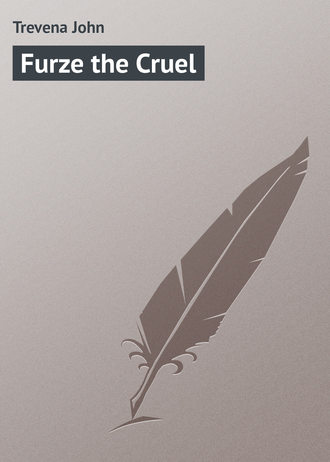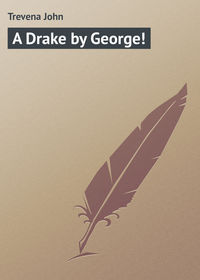 полная версия
полная версияFurze the Cruel
Brightly reached the moor gate. On the other side was the long straggling village of St. Mary Tavy. Beside the gate was a heap of refuse. Brightly seated himself upon it, because he thought it was the proper place for him.
"I be cruel hungry, Ju," explained Brightly.
"So be I," said the dog's tail.
"Fair worn to bits tu," went on Brightly.
"Same here," said the tail.
"Wait till us has the cart," said Brightly cheerily, placing the rabbit-skins upon the dirt beside him. "Us won't be worn to bits then. Us will du dree times the business, and have a cottage and potato-patch, and us will have bread and cheese two times a day and barrel o' cider in the linny. Us will have fat bacon on Sundays tu."
Brightly did not know that ambition is an evil thing. It was ridiculous for him to aspire to a cottage and potato-patch, and bread and cheese three times a day. Kindly souls had created stately mansions for such as he. There was one at Tavistock and another in Okehampton; beautiful buildings equipped with all modern conveniences where he could live in comfort, and not worry his head about rabbit-skins, or about Ju, or about such follies as liberty and independence, or about such unnecessary aids to existence as the moorland wind, his river Taw, the golden blossoms of the gorse, the moonlight upon the rocks, and the sweet scent of heather. Brightly was an unreasonable creature to work and starve when a large stone mansion was waiting for him.
"Us ha' come a cruel long way, Ju," said the little man, descending from his dream. "Only two rabbit-skins. Business be cruel bad. Us mun get on. This be an awkward village to work. It be all scattery about like."
Brightly rose with some alacrity. The moor gate rattled. The hand of the village constable was upon it, and the eyes of that official, who was to Brightly, at least, a far more considerable person than the Lord Chief Justice, were regarding the vagabond with a suspicion which was perfectly natural considering their respective positions.
"Good-evening, sir," said Brightly with deep humility. The policeman was not called upon to answer such things as Brightly. He condescended, however, to observe in the severe tones which his uniform demanded: "Best be moving on, hadn't ye?"
Brightly agreed that it was advisable. He was well aware he had no right to be sitting upon the heap of refuse. He had probably damaged it In some way. The policeman had his bicycle with him, as he was on his way to Lydford. Brightly stood in a reverential attitude, held the gate open, and touched his cap as the great man rolled by. The constable accepted the service, without thanks, and looked back until the little wanderer was out of sight. Such creatures could be turned to profitable uses after all. They could be made to supply industrious village constables with opportunities for promotion. They could be arrested and charged with house-breaking, rick-burning, or swaling out of season; if such charges could not be supported, they could be summoned for keeping a dog without a licence. The policeman made a note of Brightly, as business was not very flourishing just then. There was the usual amount of illegality being practised by the commoners; but the village constable had nothing to do with that. Commoners are influential folk. A man could not meddle with them and retain his popularity. The policeman had to be polite to his social superiors, and salute the elders of Ebenezer with a bowed head, and wink violently when it was incumbent upon him so to do.
Dartmoor has no reason to be proud of St. Mary Tavy, as it is quite the dreariest-looking village upon the moor. Even the river seems to be rather ashamed of it, and turns away as if from a poor relation. St. Peter, over the way, is much more cheerful. They were well-to-do once, these two. They were not only saints, but wealthy, in the good days when the wheals were working and the green stain of copper was upon everything. Now they have come down in the world. The old gentleman lets lodgings, and the old lady takes in washing. They have put away their halos, dropped their saintly prefix, and it is exceedingly improbable that they will ever want them again. They always found it hard work to live up to their reputations; not that they tried very much; but now they are both easy and comfortable as plain everyday folk, neither better nor worse than their neighbours Brentor and Lydford. Peter is a fine, rugged old gentleman; but Mary is decidedly plain with age. There is nothing tender or pleasant about her. She is shamelessly naked; without trees or bushes, and the wheal-scarred moor around is as bald as an apple. The wind comes across her head with the blast of ten thousand bagpipes; and when it rains upon St. Mary – it rains!
Brightly knew all about that rain. He had often played the Seal upon that wild road, and had felt the water trickling down his back and making reservoirs of his boots; while people would stand at their windows and laugh at him. Nobody had ever asked him to come in and take shelter. Such an idea would never have occurred to them. Ponies and bullocks were out upon the moor in all weathers, and every winter some died from exposure. Brightly was nothing like so valuable as a pony or bullock, and if he were to die of exposure nobody would be out of pocket.
Brightly went from cottage to cottage, but there were no rabbit-skins that day. There seemed to be a rabbit famine just then. Lamps were lighted in windows here and there. When the doors were opened Brightly felt the warmth of the room, smelt the glowing peat and the fragrant teapot, and sometimes saw preparations for a meal. What a wonderful thing it must be, he thought, to have a room of one's own; a hearth, and a mantelpiece holding china dogs, cows with purple spots, and photographs of relations in the Army; a table covered with rare and precious things, such as waxen fruit beneath a dome of glass, woollen mats, and shells from foreign lands; a clock in full working order; a dresser stocked with red and green crockery; and upon the walls priceless oleographs framed in blue ribbon, designed and printed in Austria, and depicting their Royal Highnesses the Duke and Duchess of Cornwall, simpering approvingly at a scarlet Abraham in the act of despatching a yellow Isaac with a bright-blue scimitar. Brightly sighed as each door was closed upon him, and each smoky little paradise disappeared. He was having a run of bad luck. Ju knew all about it. She put what was left of her tail between her legs and shivered. No doubt she wished she had been born into the world a genuine dog, and not a mongrel; just as Brightly sometimes wished he had been born a real human being, and not a poor thing which dealt in rabbit-skins.
He reached the top of the village. The road heaved above him, and then came the bare upland. He could do no more that evening. There was no food, or fire, or shelter for him. He knew of a barn in which he could sleep at Brentor, but it was too late to go back there. Darkness was coming on. Brightly did not require to feel in his pocket to discover the state of his finances. He knew he had just twopence.
There was a gate beside him, and on the other side a row of very small whitewashed cottages one room high, which had been built for miners in the days when Mary Tavy had been a saint and prosperous; they were then occupied by assorted families. Brightly stumbled through and knocked at the door of the first. It was opened by a young woman nursing a baby; another was hanging to her skirts; a third sprawled under the table; there was a baby in a cradle, another wrapped upon a chair. It appeared to be a congress of babies. The place was crawling with them. It was a regular baby-warren. They had been turned out wholesale. Even Brightly felt he had come to the wrong place, as he asked the extraordinarily fertile female if she would give him a cup of tea and piece of bread for one penny.
The answer was in the negative. The woman was inclined to be hysterical, which was not surprising considering her surroundings. She was alone in the house, if she could be called alone when it was hardly possible to step across the floor for babies which were lying about like bees under a lime-tree. Brightly was known as a vagabond. He looked quite the sort of man who would murder her and all the children. She told him to go away, and when he did not move, because he had not heard, she began to scream.
"I'll send for policeman if ye don't go. You'm a bad man. Us knows ye. Coming here to scare me, just as I be going to have a baby tu. 'Twill be cross-eyed, poor dear, wi' yew overlooking me. Get along wi' yew, or I'll call neighbours."
Brightly begged her pardon in his soft voice and went. He knew it was no use trying the other cottages. The woman with the army of children would only follow from door to door, and describe how he had insulted her. He made his way to the top of the village and sat upon the hedge. Ju crouched beside him and licked his boots. It was a fine evening, only they were too hungry to appreciate it properly.
"Us mun get food, or us wun't tramp far in the morning," said Brightly. "This wind du seem to mak' a stomach feel cruel empty."
"Makes a dog's stomach empty too, father," said the eloquent tail of Ju.
"Us will go to the shop, and get what us can for a penny. Mun keep one penny for to-morrow," said Brightly.
He turned his dim eyes towards the road. A horse was trotting up the long hill, and presently he saw it; a big ugly grey with a shaggy coat. Brightly knew who it was approaching him, and had there been time he would have hidden, because he was afraid of the man who rode. "It be Varmer Pendoggat," he whispered. "Don't ye growl, Ju."
Possibly the rider would have passed without a word, but the grey horse saw the creatures upon the hedge and shied, crushing the rider's leg against one of the posts opposite. This was unfortunate for Brightly, as it was clearly his fault. Quaint objects with big spectacles and rabbit-skins have no business to sit upon a hedge in the twilight. He had frightened the horse, just as he had frightened the woman with a family. The horse had hurt his master, and Pendoggat was not the sort of man to suffer patiently.
There is a certain language which must not be described. It may be heard to perfection in the cheap enclosures at race-meetings, in certain places licensed to sell beer, at rabbit-shoots, and in other places where men of narrow foreheads come together and seem to revert to a type of being which puzzles the scientist, because there is nothing else in the entire animal world quite like it. Pendoggat made use of that language. He had a low forehead, a scowling face, small eyes, which looked anywhere except at the object addressed, bushy black moustache, and high cheek-bones. He never laughed, but when he was angry he grinned, and spittle ran down his chin. He was a strong man; it was said he could pick up a sack of flour with one hand. He could have taken Brightly and broken him up like a rotten stick. Most people were respectful to Pendoggat. The village constable would have retired on a pension rather than offend him.
"I be sorry, sir. I be cruel sorry," muttered poor shivering Brightly. "I did bide still, sir, and I told the dog to bide still tu. I hopes you hain't hurt, sir. Don't ye be hard on I, sir. Us have had a bad day, and us be hungry, sir."
Pendoggat replied with more of the same language. He tried to destroy Ju with his thick ground-ash, but the wise cur escaped. Then he sidled the horse towards the hedge, and crushed Brightly against its stones. He saw nothing pathetic in the poor thin creature's quivering face and half-blind eyes; but he obtained some enjoyment out of the piping cry for mercy. Brightly thought he was going to be killed, and though he didn't mind that much, he did not want to be tortured.
"Don't ye, sir. Don't ye hurt I," he cried. "I didn't mean it, sir. I was biding quiet. You'm hurting I cruel, sir. I'll give ye two vases, sir, purty vases, if yew lets I go."
Pendoggat struck his horse, and the animal started back. Brightly reached his raw hand up the hedge and lifted his basket tenderly. It was like losing flesh and blood to part with his vases, but freedom from persecution was worth any ransom. He removed the oil-cloth. What was left of the light softened the hideous ware and made the crude colouring endurable.
"Tak' two, sir," said Brightly piteously. "Them's the best, sir."
"Give me up the basket," Pendoggat muttered.
The shivering little man lifted it. Pendoggat snatched at the handle, pulled out a vase, and flung it against the stone hedge. There was a sharp sound, and then the road became spotted with red and yellow fragments.
This was something which Brightly could hardly understand. It was too raw and crude. He stood in the road, with his hands swaying like two pendulums against his thin legs, and wondered why the world had been made and what was the object of it all. There was another crash, and a second shower of red and yellow fragments. Pendoggat had selected his pair of vases, and he was also enjoying himself. He looked up and down, saw there was no one in sight; Dartmoor is a wild and lawless place, and nobody could dictate to him. He was a commoner; master of the rivers and the granite. Brightly said nothing. He lifted a red hand for his basket, which contained what was left of his capital, but Pendoggat only struck the clumsy fingers with his ground-ash. It was darker, but a wild gleam was showing over what had been Gubbings Land. The moon was coming up that way.
"I'll learn ye to scare my horse," growled Pendoggat. "I saw you shake your hand at him. I heard you setting on the dog. If I was to give you what you deserve, I'd – " He lifted his arm, and there was another crash, and more flesh and blood were wasted.
"Don't ye, sir," cried Brightly bitterly. "It be ruin, sir. I tored they once avore, and 'twas nigh a month 'vore I could start again. I works hard, sir, and I du try, but I've got this asthma, sir, and rheumatism, and I can't properly see, master. I've been in hospital to Plymouth, sir, but they ses I would never properly see. 'Tis hard to start again, master, and I ain't got friends. Don't ye tear any more, master. I'll never get right again."
Pendoggat went on smashing the vases. There were not many of them, not nearly enough to satisfy him. The last was shattered, and he flung the basket at Brightly, hitting him on the head, but fortunately not breaking his spectacles. Brightly wanted to be alone; to crawl into the bracken with Ju, and think about many things; only Pendoggat would not let him go.
"Hand up those rabbit-skins," he shouted. He was growing excited. Smashing the vases had put passion into him.
"I've tramped ten miles for they, master. Sourton to Lydford, and Lydford to Brentor, and Brentor to Mary Tavy. Times be very bad, sir. Ten miles for two rabbit-skins, master."
"Hand them up, or I'll break your head."
Brightly had to obey. Pendoggat flung the skins across the saddle and grinned. He passed his sleeve across his lips, then put out his arm, seized Brightly by the scarf round his neck, and dragged him near. "If I was to give ye one or two across the head, 'twould learn ye not to scare horses," he said.
Brightly shivered a little more, and lifted his wizened face.
"Got any money? Tell me the truth, or I'll pull the rags off ye."
"Duppence, master. 'Tis all I has now you'm torn the cloam and got my rabbit-skins. If it warn't for the duppence I don't know what me and Ju would du."
"Hand it over," said Pendoggat.
"I can't, master. I can't," whispered Brightly, gulping like a dying fish.
"Hand it over, or I'll strangle ye." Then in a fit of passion he dragged Brightly right across the saddle and tore his pocket open. The two copper coins fell into his hand. He dropped Brightly upon the red and yellow fragments, which cut his raw hands, then hit his horse, and rode on triumphing. He had punished the miserable little dealer in rubbish; and he fancied Brightly would not venture to frighten his horse again.
Pendoggat rode up to the high moor and felt the wind. He was about to strike his horse into a canter, when a spectre started out of the gloom, a wizened face reached his knee, an agonised voice cried: "Give I back my duppence, master. Give I back my duppence."
Pendoggat shivered. He did not enjoy the sound of that voice, or the sight of that face. He thought of death when he saw that face. Brightly was only one of the mean things of the earth, and mean things make a fuss about trifles. That face and that voice all over the loss of twopence! Probably the wretched thing was mad. Honest men are often frightened when they see lunatics.
"Us be cruel hungry, master. Us have eaten nought all day. Us have lost our cloam and our rabbit-skins. Give I back my duppence, master. I'll work for ye to-morrow."
Pendoggat hit his horse, and the animal cantered away, and the spectre troubled him no longer. He wiped his chin again and felt satisfied. He had made a poor creature suffer. There was a certain amount of crude pleasure in that thought. But why had that face and voice suggested death, the death of a man who has used his power to deprive a poor wretch of his vineyard? Pendoggat flung the rabbit-skins into the gaping pit of a mine-shaft and cantered on. He was a free man; he was a commoner; the rivers and the rocks were his.
Brightly stumbled back to the hedge to reclaim his empty basket. He talked to Ju for a little, and tried to understand things, but couldn't. He would have to start all over again. He discovered a turnip, which had probably rolled out of a cart and was therefore any one's property, and he filled his stomach with that. Ju raked a bone bearing a few sinews out of a rubbish-heap. So they might have done worse.
At the top of the village was an old cow-barn. Above was a loft containing a little dry fern. Brightly and Ju lodged there. It was quite away from other buildings, standing well out upon the moor, therefore nobody heard a queer piping voice, singing and feasting on the quaint doggerel far into the night —
"Jerusalem the golden,Wi' milk and honey blest…CHAPTER III
ABOUT PASTOR AND MASTER
Unpleasant creatures are so plentiful in the world that they cannot be overlooked. Were there only a few they might be ignored; but they throng, they thrust themselves forward, they shout to attract attention, they push the decent-looking out of the way. The ugliest women make the most noise; the ugliest men shove to the front in a crowd; the ugliest insects make their way into bed-chambers. Why Nature made so much ugliness, side by side with so much that is beautiful, only Nature knows. Some countries are made detestable to live in by the presence of hideous creatures. There is the fire-ant of the Amazon valley, which will put human beings to flight. There is the Mygale spider, covered with poisonous red hair, its body the size of a duck's egg, the spread of its legs covering eight inches, which scuttles into a room by moonlight and casts a horrible shadow upon the bed. There is the wolf-spider which, if a man passes near its lair, will leap out and pursue him, and bite him if it can. There are so many of these repulsive things that they cannot be disregarded. Some things can be kept out of the way: abattoirs, operating-theatres, vivisection-hells. People ignore and forget these, because they are not seen; but the man wolf-spider cannot be forgotten, because he leaps out and pursues those that come near his lurking-place.
Nothing in the entire system of creation can be more inexplicable than the persistent cruelty of Nature. Death there must be, but Nature resents a painless death. Animals not only kill but torture those which are inferior to them. Mason-wasps deliberately vivisect spiders, which are insects extremely tenacious of life. It is the same all the way along the scale up to and including man. Nature does her work with bloody hands; birth, life, death, become a miserable dabble of blood and passion. Some people shut their eyes to it all; others cannot; others add to it; churches with their tolling bells and black masses revel in the mystic side of it.
There is not a person living who has not done an act of cruelty. It is impossible to refrain from it. However kindly the soul may be Nature will whisper bloody messages; and some day there is sure to be a temporary breakdown. In a town the wretched business is not much seen. It lurks in the dark corners, like the Mygale spider, and comes out perhaps at moonlight to cast its shadow upon the bed. On the sparsely inhabited moor it is visible, for it cannot hide away so easily, and it tries less because it is fiercer. It is like the wolf-spider which dashes out in a mad fury. Upon a wild upland passions are fiercer, just as physical strength is greater. Everything seems to suggest the dark end of the scale; the rain is more furious, the clouds are blacker, the wind is mightier, the rivers are colder; Nature is at full strength. She is wild and lawless, and men are often wild and lawless too. Tender lilies would not live upon the moor, and it is no use looking for them. They are down in the valleys. Upon the moor there is the granite, the spiny gorse, the rugged heather. It is no use looking for the qualities of the lily in those men who are made of the granite, and gorse, and heather.
Pendoggat was the sort of man who might have melted into tears at hearing a violin played, and then have kicked the performer down a wheal if he asked for a copper. Nature turns out a lot of contradictory work like that. She never troubles to fit the joints together. Had any one told Pendoggat he was a cruel man, he would first of all have stunned the speaker into silence, and then have wondered whatever the man had been driving at. It is a peculiarity of cruelty that it does not comprehend cruelty. No argument will persuade a rabbit-trapper that the wretched animals suffer in the iron jaws of his traps. The man who skins an eel alive, and curses it because it won't keep still, cannot be brought to understand that he is doing anything inhuman. Perhaps he will admit he had never given the subject a thought; more probably he will regard the apostle of mercy as a madman. The only way to enlighten such men is to skin them alive, or compel them to tear themselves to death in an iron trap; and there are, unfortunately, laws to prevent that. The only just law ever made was the lex talionis, and Nature recognises that frequently. Pendoggat trapped rabbits in his fields, and if they were not dead when he found them he left them as a rule. The traps were supposed to kill them in time, and the longer they were in dying the longer their flesh would keep. That was the way he looked at it. Quite a practical way.
Very likely Pendoggat was of Spanish extraction in spite of his Cornish name. The average Cornishman has a thoroughly good heart, and is, if he be of the true stock, invariably fair. The Cornish man or maid who is dark owes something to foreign blood. There are in Cornwall many men and women so strikingly dark as to attract attention at once; and if their ancestry could be traced back a couple of hundred years it might be found that a Spanish name occurred. While the stout men of Devon were chasing the Armada up channel and plucking the Admiral's feathers one by one, and the patriotic Manacles were doing Cornwall's share by giving the big galleons a hearty welcome, many a shipwrecked sailor found his way into the cottages of fishermen and wreckers, and with the aid of a pocketful of gold pieces made themselves at home. Some possibly were able to return to Spain; others probably seduced their protectors' young women; others were lawfully wedded; others settled down in their new land and took a Cornish name. It is a difficult piece of history to trace, and much must remain pure hypothesis; but it is fairly certain that had there been no Spanish Armada to invade England, and to send Queen Elizabeth to her writing-tablets to reel off a lot of badly-rhymed doggerel in imitation of Master Spenser, there would also have been no Farmer Pendoggat dwelling at Helmen Barton in the parish of Lydford and sub-parish of St. Mary Tavy, as a commoner of Dartmoor and a tenant in name of Elizabeth's descendant the Duke of Cornwall.
There was nothing of a sinister nature about the Barton. Even its name meant simply in its original Celtic the place of the high stone; hel being a corruption of huhel, and men one of the various later forms of maen; just as huhel twr, the high tor, has now become Hel Tor. Wherever people have been given a chance of dragging in the devil and his dwelling-place they have taken it; actuated, perhaps, by the same motive which impelled the old dame to make a profound reverence whenever the name of the ghostly enemy was mentioned, as she didn't know what would be her fate in a future state, so thought it wise to try and propitiate both sides. The Barton was a long low house of granite, damp and ugly. No architect could make a house built of granite look pleasant; no art could prevent the tough stone from sweating. It was tiled, which made it look colder still. Creepers would not crawl up its walls on account of the winds. One half of the Barton was crowded with windows, the other half appeared to be a blank wall. A good many farm-houses are built upon that plan, the stable and loft being a continuation of the dwelling-house, and to all outward appearance a part of it. There was not a tree near the place. The farm was in a fuzzy hollow; above was a fuzzy down. It ought to have been called Furzeland, a name which is borne by a tiny hamlet in mid-Devon, which nobody has ever heard of, where the furze does not grow. The high stone which had named the place – probably a menhir – had disappeared long ago. Some former tenant would have broken it up and built it into a wall. The commoners' creed is a simple one, and runs thus: "Sometimes I believe in God who made Dartmoor. I cling to my privileges of mining, turbary, and quarrying. I take whatever I can find on the moor, and give no man pay or thanks. I reverence my landlord, and straighten his boundary walls when he, isn't looking. The granite is mine, and the peat, and the rivers, and the fish in them, and so are the cattle upon the hills, if no other man can put forward a better claim. No foreign devil shall share my privileges. If any man offers to scratch my back he must pay vor't. Amen."





